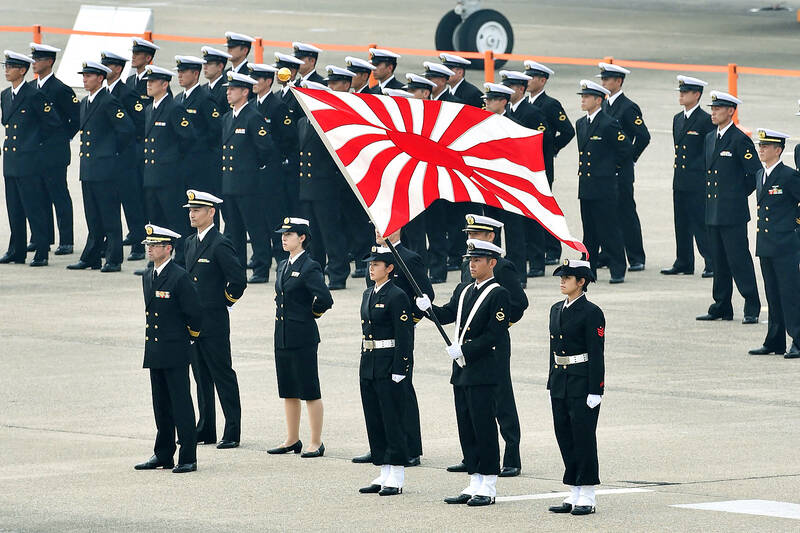Japanese Prime Minister Fumio Kishida on Friday pledged alongside US President Joe Biden to modernize his country’s military, warning that Russia’s invasion of Ukraine had opened a dangerous new era and could embolden China.
Welcoming Kishida at the White House, Biden hailed the Japanese government’s announcement last month that it would double defense spending over the next five years and develop new capabilities.
“Let me be crystal clear: the United States is fully, thoroughly, completely committed to the alliance and, more importantly, to Japan’s defense,” Biden said.

Photo: AFP
Japan has been officially pacifist since its defeat in World War II, but has been shedding past sensitivities as China rapidly expands its military and North Korea tests new missile capability.
In a speech after his White House meeting, Kishida cast his defense strategy as a historic turning point in the US-Japan alliance, in the same league as the mutual defense treaty of 1960.
“Russia’s aggression against Ukraine has marked the complete end of the post-Cold War world,” Kishida said at Johns Hopkins University’s School of Advanced International Studies.
“If we let this unilateral change in the status quo by force go unchallenged, it will happen elsewhere in the world, including Asia,” Kishida said, in an apparent allusion to fears of a Chinese invasion of Taiwan.
“It is absolutely imperative for Japan, the United States and Europe to stand united in managing our respective relationship with China,” he added.
Japan has joined Western powers in imposing sanctions on Russia and has provided humanitarian — although not military — aid to Ukraine since Russia invaded in February last year.
Kishida called it a “major shift” in Japan’s policy toward Russia following unsuccessful marathon talks to resolve a dispute over islands seized by Soviet troops shortly after Tokyo’s surrender in 1945.
Kishida was visiting Washington at the end of a tour of G7 nations in Europe and North America.
“Japan’s participation in the measures against Russia transformed the fight against Russia’s aggression against Ukraine from a transatlantic one to a global one,” Kishida said.
Biden hailed Japan’s firmness on Ukraine during the leaders’ meeting in the Oval Office.
Kishida also discussed with Biden Washington’s restrictions on the export of key technology to China, announced in October, in an effort to stifle Beijing’s development of a semiconductor supply chain.
Kishida told Biden that he would deal with chip export restrictions appropriately, an official told reporters following the leaders’ meeting.
“They agreed on the importance of managing exports of sensitive technology, particularly from the point of view of economic security,” Japanese Deputy Chief Cabinet Secretary Seiji Kihara said.
Japan will continue to deal with the issue based on the direction of regulations of partner countries, including the US, Kihara cited Kishida as saying in the meeting.
Additional reporting by Bloomberg and Reuters

The combined effect of the monsoon, the outer rim of Typhoon Fengshen and a low-pressure system is expected to bring significant rainfall this week to various parts of the nation, the Central Weather Administration (CWA) said. The heaviest rain is expected to occur today and tomorrow, with torrential rain expected in Keelung’s north coast, Yilan and the mountainous regions of Taipei and New Taipei City, the CWA said. Rivers could rise rapidly, and residents should stay away from riverbanks and avoid going to the mountains or engaging in water activities, it said. Scattered showers are expected today in central and

People can preregister to receive their NT$10,000 (US$325) cash distributed from the central government on Nov. 5 after President William Lai (賴清德) yesterday signed the Special Budget for Strengthening Economic, Social and National Security Resilience, the Executive Yuan told a news conference last night. The special budget, passed by the Legislative Yuan on Friday last week with a cash handout budget of NT$236 billion, was officially submitted to the Executive Yuan and the Presidential Office yesterday afternoon. People can register through the official Web site at https://10000.gov.tw to have the funds deposited into their bank accounts, withdraw the funds at automated teller

COOPERATION: Taiwan is aligning closely with US strategic objectives on various matters, including China’s rare earths restrictions, the Ministry of Foreign Affairs said Taiwan could deal with China’s tightened export controls on rare earth metals by turning to “urban mining,” a researcher said yesterday. Rare earth metals, which are used in semiconductors and other electronic components, could be recovered from industrial or electronic waste to reduce reliance on imports, National Cheng Kung University Department of Resources Engineering professor Lee Cheng-han (李政翰) said. Despite their name, rare earth elements are not actually rare — their abundance in the Earth’s crust is relatively high, but they are dispersed, making extraction and refining energy-intensive and environmentally damaging, he said, adding that many countries have opted to

PEACE AND STABILITY: Maintaining the cross-strait ‘status quo’ has long been the government’s position, the Ministry of Foreign Affairs said Taiwan is committed to maintaining the cross-strait “status quo” and seeks no escalation of tensions, the Ministry of Foreign Affairs (MOFA) said yesterday, rebutting a Time magazine opinion piece that described President William Lai (賴清德) as a “reckless leader.” The article, titled “The US Must Beware of Taiwan’s Reckless Leader,” was written by Lyle Goldstein, director of the Asia Program at the Washington-based Defense Priorities think tank. Goldstein wrote that Taiwan is “the world’s most dangerous flashpoint” amid ongoing conflicts in the Middle East and Russia’s invasion of Ukraine. He said that the situation in the Taiwan Strait has become less stable